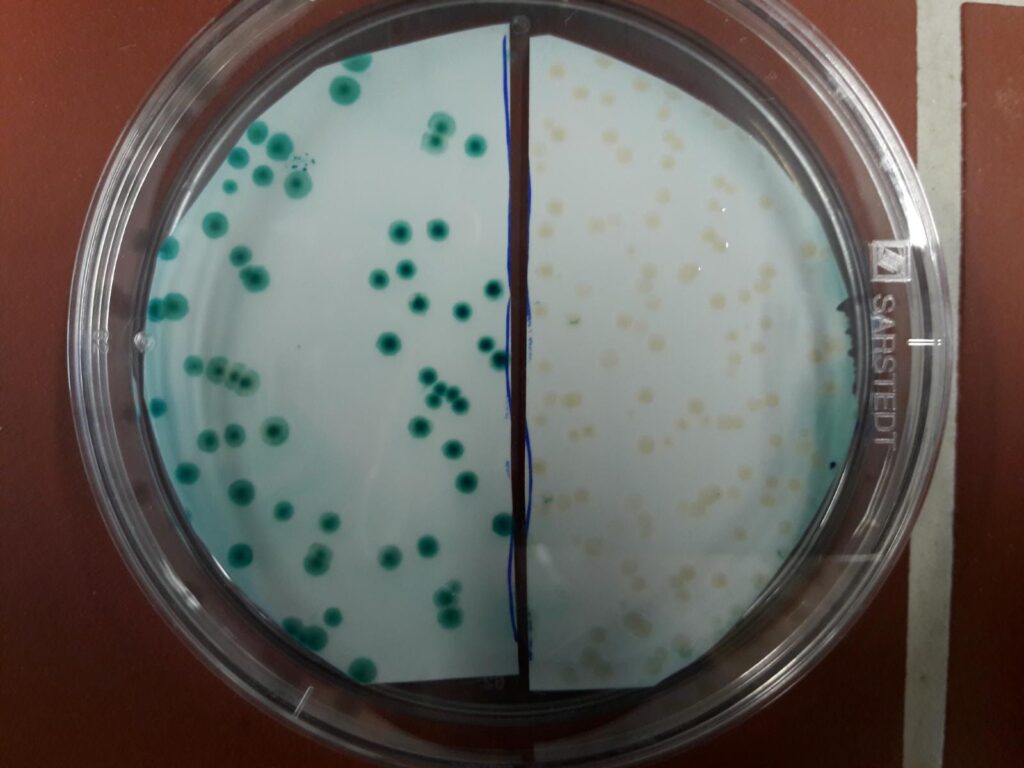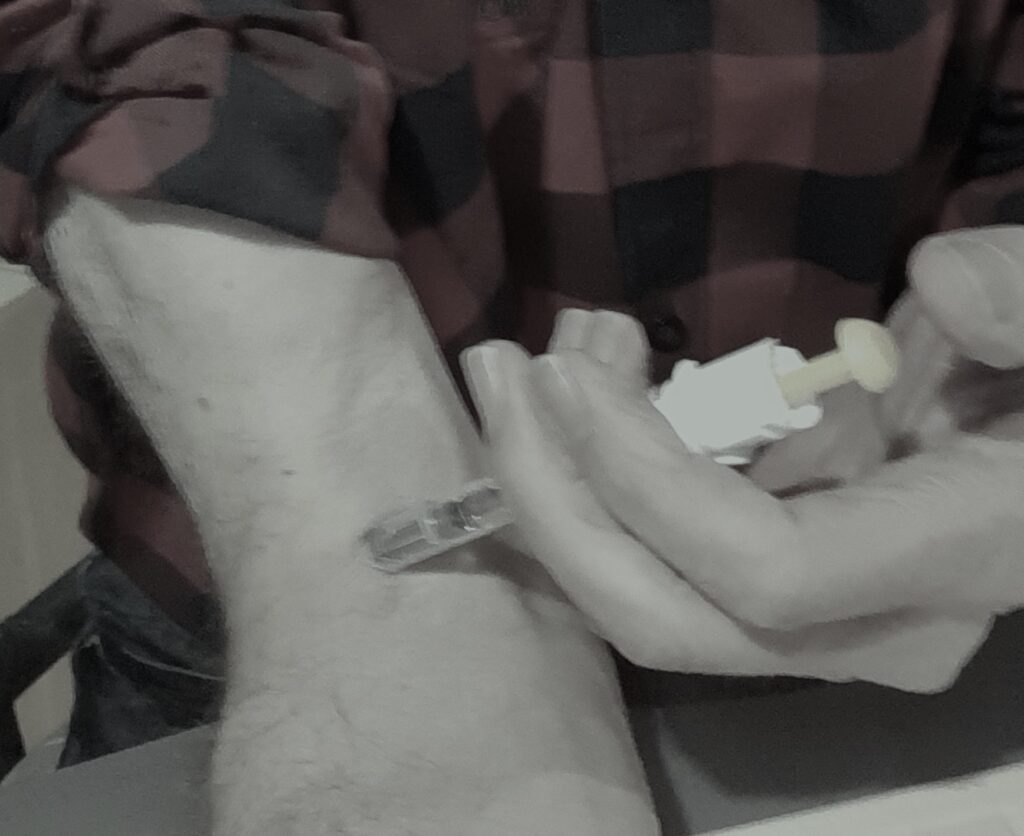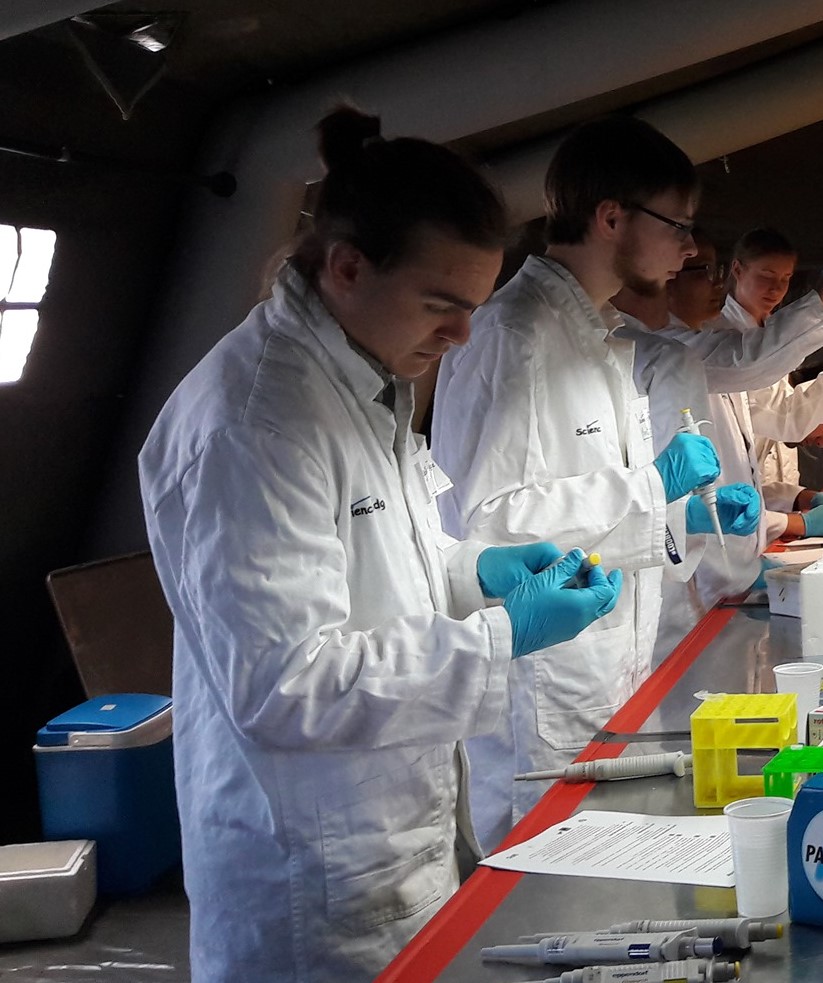CRISPR in the kitchen?
This article puts Jo (formerly Josiah) Zayner back in the spotlight.
Zayner had already caused a stir in Germany in 2017 when the first school experiment on CRISPR-Cas was distributed by his company “The Odin”. With great interest, our association “Science Bridge” had tested the kit and came to the simple conclusion that it was no good. Besides insufficient quality control, the design of the experiment was wrong and could not really work at all. Moreover, according to the German legislation on genetic engineering, it was prohibited in German schools. However, the “Odin experiment” had motivated us to try a new approach. This experiment works and is now distributed by the American company miniPCR.

It is being used in hundreds of schools in the USA and other countries. In Germany it is prohibited or only allowed in special safety laboratories which are usually not available at schools. Some school labs, especially the “Gläserne Labor” in Berlin offer the experiment in their S1 labs. Previously, this was also possible in Kassel, but then had to be discontinued due to the intervention of the university. This was probably completely in the sense of Harald Ebner, genetic engineering expert of the B90/Grüne political party, who considers such insights dangerous and irresponsible. Even on personal invitation he refused to participate in such a course and obtain insights into the pedagogic concept..
Jo Zayner now wants to launch a “bio-hacker” or “DIY biology” kit that can edit human cells in cell culture using CRISPR-Cas. From the onset, his motivation was to “democratize” genetic engineering on humans: everyone should have the right to use CRISPR-Cas at home and to carry out self-experiments on their own bodies. Zayner had already propagated this in 2017 with a CRISPR-Cas self-injection on open stage.

(Photo: BioWissKomm, 2023)
I believe it is absolutely necessary that not only schools but also the general public can get comprehensible insights into CRISPR-Cas technology. Practice in the lab is much better than reading the theory in a textbook.
However, there is a huge difference between having lay people perform a model experiment under the guidance of expert personnel and sending a kit to lay people by mail. In the first case, the aim is to understand the procedure and objectives of science, to see the (current) limits of the technology and, above all, to recognize ethical aspects. In the second case, experimentation is done more or less competently, often/mostly without feedback and advice from experienced colleagues.
The “bio-hacker” scene is, especially in the USA, very diverse and ranges from PhDs in molecular biology to absolute laymen who have done their “studies” on Google and Facebook.
In the vast majority of cases, these are enthusiastic young people who are inquisitive and want to gain experience with their own hands. The results they achieve with their experiments are sometimes impressive, sometimes even scientifically relevant. They have also contributed to the development of very simple and inexpensive equipment. However, only very few of the scientifically competent believe that they can compete with the large, professional laboratories – and do not intend to. Small successes and a recognized contribution to science, however, is what almost everyone wants.
Part of the “bio-kacker” scene is motivated by own diseases or by diseases in friends and family. They see CRISPR-Cas as the “silver bullet” that will solve all problems. When a belief in “salvation”, insufficient knowledge and a lack of experience come together, a dangerous scenario can arise. By this I do not mean that new epidemics or other gene monsters will escape from kitchen laboratories; this is extremely unlikely. Much more likely is the possibility that the bio-hackers will harm themselves.
- The most trivial but most probable harm is to be “caught”. In Germany, there is almost no molecular genetic experiment that is not subject to the Genetic Engineering Act. Anyone who carries out at home an experiment that has been routinely performed for 30 years in university beginner’s courses will be prosecuted and subjected to high fines and other severe sanctions.
- Not all chemicals used in molecular genetics experiments are harmless. Because the quantities are very small, there is not much risk to do significant harm to the environment or to other people. But there is a risk for biohackers with little experience to harm themselves.
- I see a rare but distinct danger in self-experimentation as exemplified by Zayner’s self-injection (even though he later apologized for it) and as indirectly motivated by his kit. The strict safety regulations for experiments on humans make sense. The risk of samples not being adequately purified and being e.g. contaminated with toxins or pathogens, is real. Zayner has involuntarily demonstrated this previously: the first kits he sold to Europe accidentally contained a mixture of partially pathogenic bacteria instead of a pure E. coli culture.
A video by Justin Atkin shows the problem. He has undoubtedly approached a scientific question quite professionally and warns explicitly against any form of self-experimentation. At the beginning of the video, however, he does just that! Laypeople and less professional novices get the impression “nothing will go wrong” and “How cool! I can ‘gene manipulate’ myself!”. Without the self-experiment and the implication that it was successful, the video would be really good!
Furthermore, the exaggerated CRISPR-euphoria harms science. The development of gene therapies takes a long time and the costs are in the 6- to 7-digit range. And these are not only the profits of the pharmaceutical industry! An attempt to do this faster and cheaper (and still safe) in the kitchen, is unrealistic.
A popular allegation by opponents of genetic engineering is that the industry has “failed to deliver useful products” and that there are “unpredictable risks”. If bio-hackers try to “just develop a therapy in the kitchen”, this is grist to the opponents’ mill! It simply doesn’t work that way. They will mostly fail and the slightest accident would be a massive setback for genetic engineering as a whole.
One could ban DIY biology or make it illegal by a partly absurd legislation. However, it would be fatal for Germany as a country for education and innovation to “stifle” the upcoming generation of scientists by denying them insights and experience.
Instead, we must “capture” the young enthusiasts and teach them the appropriate skills (also outside the university). To do this, we need free spaces in which experiments can be carried out legally and under professional guidance (and supervision!). This is not about paternalism, but about technical discussions at a more or less high level, depending on the hackers’ level of knowledge.

No, at the Science Festival “Children of Doom” (2019 in Berlin), interested laypeople worked on a CRISPR experiment in a bio-safety tent lab with expert advice.
(Photo: Science Bridge)
There is a lot of talk about “Citizen Science”. However, this should not only consist of counting birds and insects; it can also take place in the field of genetic engineering if appropriate conditions are supplied and molecular biology experiments are not politically turned into “criminal acts”.
By Wolfgang Nellen, BioWissKomm
Translated with www.DeepL.com/Translator (free version), modified by the author.

